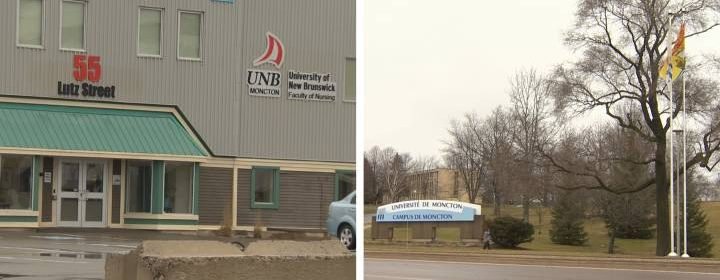New Brunswick nursing program cuts a ‘bit premature’: union president

Officials at the University of New Brunswick and Université de Moncton are voicing concern over a cut of almost $9-million in funding for nursing programs.
In a joint statement Friday, the schools said the funding has supported clinical training for all students, and could risk their contribution to trying to solve a shortage of nurses across the province.
“Due to various factors, enrolment numbers have not attained the targets in recent years, so neither institution has been able to benefit fully from this portion of the funding,” read the statement, signed by Dr. Jacques Paul Couturier, who is the interim president and vice-chancellor of the UdeM, and Dr. Eddy Campbell, the president and vice-chancellor of UNB.
Sarah Bustard, a spokesperson for the province’s department of post-secondary education, training and labour, sent a statement saying the agreements were mainly intended to add more seats.
“As part of the agreement, there was some funding towards clinical training. However, a significant portion of the agreement and the funding tied to the agreement was to go towards adding additional seats,” said Bustard.
She says while the agreements, which expired March 31, were to add an additional 95 nursing seats per year, no additional bachelor of nursing seats has been created in the last four years.
The move came without adequate consultation, according to Paula Doucet, who is the president of the New Brunswick Nurses Union.
“If it wasn’t used to its full capacity, I think it was time that we ask the questions,” she said in a phone interview with Global News.
“I think it might have been a little bit premature to announce the funding was cut before actually digging a little bit deeper to find out how exactly it was used, why is there a waitlist at some of our university campuses, and how could we have better utilized or moved around that money to actually get more students into the program.”
Paula Doucet, the president of the NBNU, says there should have been more consultation about the cutback
Dr. George MacLean, who is the vice-president of academics at UNB, says the number of available clinical placement opportunities and the cost to educate the student nurses are reasons why their classes at capacity each year.
“It’s $24,000 a year,” he says. “Of that, we calculate about $14,000 every year, for every nursing student, goes toward the cost of their clinical experience.”
He says money was used for clinical training, but the rest had to be returned to government for not meeting targets.
MacLean says the school’s operating budget is in a deficit, and their nursing program operates, “to put it bluntly…at a loss because of the cost of clinical.”
While he says there are currently 490 students across the three campuses, they hoped for that to grow by 50 this year, 50 next year and 75 the following year.
Dr. George MacLean, UNB’s VP Academic, says
Meanwhile, Doucet says the plan wasn’t communicated with those involved, such as the union, the Nurses Association of New Brunswick, university representatives and others.
“I was frustrated with the fact that this announcement came out without any mention to the stakeholders that sit around the table for the nursing resource collaborative,” she says. “This was one of the recommendations that the stakeholders had identified to try to work towards increasing our enrollments in the New Brunswick programs for BNs.”
The government says future funding needs to go into the Nursing Human Resources Strategy.
$2.4-million was set aside in the province’s budget.
Sign up for our Health IQ newsletter
© 2019 Global News, a division of Corus Entertainment Inc.
Source: Read Full Article

